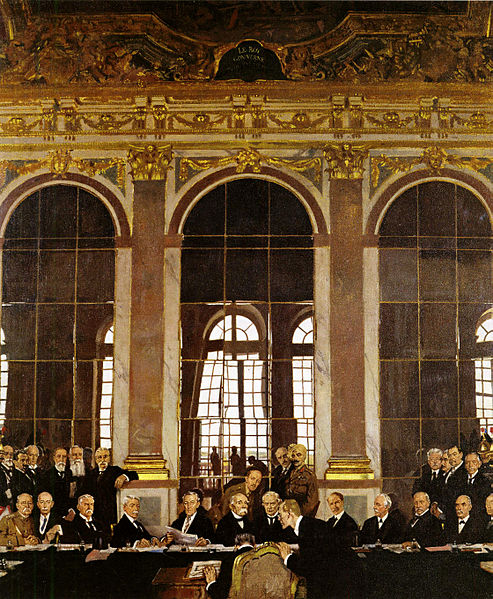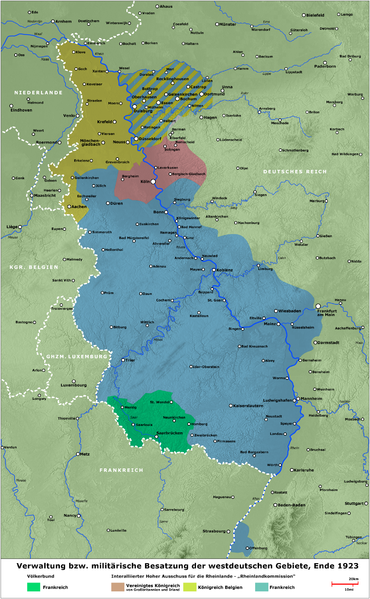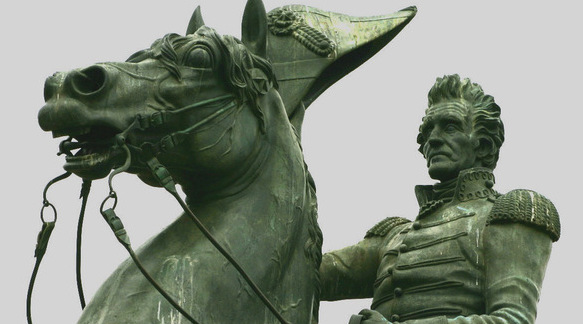A new History Channel Docudrama claims Versailles was the main cause of WWII. Too bad it's not true.
The History Channel is back…sort of. After years of ridicule as the channel of aliens, conspiracy theories and ice truckers, the once-venerated channel recently came out with a six-hour three episode docudrama on the how the men who made WWII were forged in WWI. The focus is naturally on Hitler and WWII, cementing the Channel's former reputation as the Hitler channel. Ah, well. Baby steps.
The idea itself is a good one. With the centennial soon upon us, it is past time that WWI received its due as the backdrop to the 20th century, WWII included. The idea of focusing on the story of a few individuals is also a good way to make an often dehumanizing, anonymous conflict relatable. The American bias in choosing characters – fully four of the dramatis personae are Yanks – is forgivable considering the audience; a British, French or Russian doc would no doubt be as nationally slanted.
Less forgivable is the horrifically sloppy approach to basic facts. According to the documentary, the Germans won the Turkish victory of Gallipoli, the Bolsheviks deposed the already deposed Czar and the 1941 repulse from Moscow took place at the same time as the 1942 Battle of Stalingrad. That's to say nothing of the many errors in equipment, uniforms and tactics which others on the #WorldWars hashtag have pointed out. This is the History Channel; if they expect to be taken seriously as such, they ought to do the thirty minutes of research necessary to avoid stupid mistakes like these.

Versailles as the Key to Everything
But the problems go deeper than these errors. The WorldWars or WWs docudrama presents an understanding of WWI and its aftermath that is so one-sided and simplistic that it's hard to believe this is a work of history and not pacifistic propaganda. Nowhere is this clearer than in WWs' treatment of the Versailles treaty.
If WWs is to be believed, the Versailles treaty was *the* singular source of all the world's troubles after 1918. It humiliated Japan and forced them to go to war and eventually to Pearl Harbor, the reparations it imposed drove Germany to destitution, social unrest and war, and created new nation-states which it dominated just to screw Germany.
Let's start with the easy pickings: Japan. Japan had plans for imperial expansion long before WWI. It conquered much of Korea and Taiwan and even defeated Russia in a humiliating war in 1905 (The peacemaker in that war was another Roosevelt, BTW). During the Russian Civil War, Japan even sent troops into Eastern Siberia for territorial aggrandizement. Japan thus had an empire and imperial ambitions long before Versailles; they did not need the Western humiliation to continue to conquer territory.
The "Stab in the Back" Myth
Which brings us to Germany. The idea that Versailles was singularly responsible for Hitler's rise and WWII is as old as the treaty itself. It has had a particular hold on Americans, many of whom felt then and now that America was duped into the war and who believe that Wilson's great idealism was destroyed by the evil machinations of Old Europe. Reality is far more complicated than this simplistic morality tale.
To start with, we need to understand the situation at the end of the war. When the German Army announced the need for an armistice, Germany had direct or indirect control of most of continental Europe. The German civilian populace and many of the politicians were hit with the news that they were losing after years of victory after victory. The news was so shocking that many Germans didn't believe that they'd actually lost.

Indeed, the founding myth of the nationalist right, which included the Nazi party, was that the Germans had been "stabbed in the back" by the "November criminals" – Jews, Social Democrats and others – who had forced defeat on the brink of victory or at least a favorable draw. This myth severely delegitimized the democratic Weimar government just as much if not more than the detested "Versailles diktat".
Versailles was rolled back without a shot fired
Furthermore, the desire of the allies – Britain and France especially – to restrain Germany and disarm it was not some evil machination against an essentially peaceful country. The Germany that signed the 1918 Armistice had signed the treaty of Brest-Litovsk the beginning of that year, a treaty which not only deprived the Russian Empire of much of its territory but also granted it extensive economic concessions. The Western Allies had every reason to expect that Germany would have been equally as harsh if they had lost.
The reparations imposed on Germany were indeed harsh, but they were not the final word. For one thing, the Germans did what they could to delay payment. More importantly, the amount they had to pay was continuously driven downward over the 1920s, especially under the Dawes and Young Plans (both American engineered). By the time of Chancellor Heinrich Brüning, reparations were practically dead in the water.
Germany's economic situation was as much a product of the deprivations of WWI (huge debt, manpower losses, depreciated currency) as caused by the reparations. Furthermore, it was not in the perpetual depression portrayed in the doc; not every year was hyperinflationary1923 in Weimar Germany. The same is true of their territorial losses – which were far smaller than those imposed on Austria, Hungary and Turkey, and at least some of Germany's losses were temporary.
Countries such as Czechoslovakia and Poland arose from the ashes of the three major European empires – Russia, Austria-Hungary and Germany – before Versailles was drafted or signed. As problematic as these states were to their minorities, they were a genuine and often noble expression of many nations who desired independence and self-determination after years of repression. They were not the artificial invention of the victorious powers aiming to spite Germany.

The same is true of the Rhineland. WWs falsely claims that the Rhineland region was militarily occupied by the British and French when Hitler remilitarized the region in 1936. The truth is that all Allied armies had evacuated the Rhineland in 1930 thanks to negotiations and diplomacy (the Saarland was evacuated by 1935). There were no British or French guns ready to mow down German troops. Mistakes like this not only create the impression that Germany was more a victim than it was – it misses the chance to show just how much genuine diplomacy had solved in the interwar years and how much Hitler distorted reality.
The History Channel made the right decision when it started to tie WWI to WWII. But distortions like those committed by WWs do a disservice to the complex and fascinating history of the War to End All Wars.
To receive updates on new articles in English, join Mida on Facebook or Twitter or join our mailing list.







Winston Churchill wrote a fabulous book about the interwar years. I can't think of the name of it but it was worth the reading
Just read The Pity of War, by Niall Ferguson